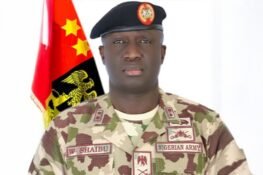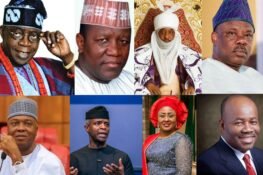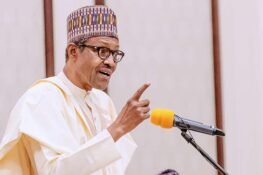A sweeping fear of insecurity has descended upon Nigeria like haze in the harmattan. Not since the Biafran Civil War of 1967-1970 has the nation been gripped by such pervading tension.
The brazen occupation, kidnap, rape, robbery and other crimes by youths from the northern part of the country that is commanding the news headlines is a sign of a nation in dreadful trouble.
During a recent visit to Nigeria, a friend expressed how worried he was that he could not reach me on an agreed schedule.
His concern was that I could have been kidnapped.
Although I laughed at the seeming exaggeration, recent developments are helping to put in perspective the degenerative state of security in the country that warranted that consideration and the attention of all of us.
The social media is rife with messages of fear, as civil groups allegedly write to international organizations asking for protection from genocide.
This fear has been exacerbated by comments by prominent leaders, energised by former President Olusegun Obasanjo.
Obasanjo chose a Christian event to speak clearly about the threat. In a speech at a Synod of the Anglican Communion, the former president alleged an agendum to Islamize Nigeria.
“It is no longer an issue of a lack of education and employment for our youths in Nigeria which it began as, it is now West African Fulanisation, African Islamisation and global organized crimes of human trafficking, money laundering, drug trafficking, gun trafficking, illegal mining and regime change,” he remarked.
There is wide suspicion that Buhari values his kinsmen above Nigeria. And this factor fuels the skepticism that he will rein in the pastoralists
Before him, former Defense Minister, General Theophilus Danjuma, had been loud.
In his characteristic directness, General Danjuma alleged that the Nigerian armed forces were working with terrorists in the interest of the Fulanis.
“The armed forces are not neutral. They collude… with the armed bandits that kill people and kill Nigerians. They facilitate their movement. They cover them.”
Danjuma described the killings in his home state of Taraba and other parts of Nigeria as a form of ethnic cleansing and warned against depending on the security forces for protection.
“If you are depending on the armed forces to stop the killings, you will all die one by one,” he warned.
Obasanjo and Danjuma have enough connections as military and political office holders to know the facts and experience to estimate how much public information can be damaging to national security.
More importantly, they fought to keep the nation together during the Civil War. When they speak, we must pay attention.
The irony is that the current leader, President Muhammadu Buhari, is also a retired general and civil war veteran.
Under Buhari’s watch, cattle rearers have replaced crooks and machetes with sophisticated rifles, threatening anyone along their way with overwhelming firepower
Unlike Obasanjo and Danjuma, Buhari is also a Muslim, northerner and Fulani, who, before becoming the president, had travelled to Oyo State to demand better treatment of Fulani herdsmen.
There is wide suspicion that Buhari values his kinsmen above Nigeria. And this factor fuels the skepticism that he will rein in the pastoralists.
Under Buhari’s watch, cattle rearers have replaced crooks and machetes with sophisticated rifles, threatening anyone along their way with overwhelming firepower. Many have changed profession from shepherds to kidnappers. It has now become difficult to distinguish between herders, robbers and Boko Haram.
Last year, former Federal Minister, Mr. Olu Falae, was kidnapped on his farm. It was a foray that caught national attention about the seriousness of the security challenges that Nigerians are now worried about. That kidnapping led some to conclude Nigeria is now disintegrating.
Nigerians are not the only ones worried about widening conflicts and insecurity. Amnesty International and the British Parliament have released reports corroborating fears that things are indeed falling apart for Nigeria.
Amnesty International, in its 2018 report, Harvest of Death, revealed there was indeed complicity by the security forces, stating that “one of the major causes of the clashes between herders and farmers is the scarcity of and competition for resources, mainly land, water and pasture.”
Nigerians are not the only ones worried about widening conflicts and insecurity. Amnesty International and the British Parliament have released reports corroborating fears that things are indeed falling apart for Nigeria
It noted a case where soldiers withdrew shortly before 33 villagers were murdered on May 1, 2018, in Adamawa State.
British lawmakers, led by Jim Shannon, concluded that the inter-communal violence between Muslim pastoralists and largely Christian farmers is caused by a struggle for land and natural resources.
They were concerned that Christians accused President Buhari of being complicit, and asked him to “focus on assisting the affected communities, bringing perpetrators to justice and examining longer term peaceful solutions to the conflict.”
.
But the first inquisition into Nigeria’s current state of insecurity started long ago. In 2011, the US Central Intelligence Agency (CIA) released a report predicting the gradual unravelling of Nigeria.
The report was disturbing, and it did annoy the Jonathan administration. Although, the assessment appeared far-fetched at the time, it was mostly analytical and factual – and it has proven largely accurate. The risks, which Nigeria attacked rather than examine, are coming true one by one.
Written during the regime of Ibrahim Babangida, the redacted CIA report, titled “Nigeria: Population Problems and Political Stability,” concluded that “Nigeria’s explosive population growth against a backdrop of dwindling oil revenues” would “create conditions conducive to serious political instability.”
The US intelligence team projected that a rapid population growth would become a constraint to national unity; and a fast-growing unemployed youth population would become a recruitment ground for radical political ideology.
As predicted, Nigeria’s population is on course to double in 10-15 years and much of the explosion has been in the north, where birth control is not part of the culture
It predicted that a number of intricate factors would metamorphose into regionalism, ethnicity, religion and urban population issues.
“Given the ‘pressures building from declining oil reve¬nues and a shrinking economy, religious and ethnic strife could intensify unless the government is seen as evenhanded and meticulously neutral…”
As predicted, Nigeria’s population is on course to double in 10-15 years and much of the explosion has been in the north, where birth control is not part of the culture.
This has given rise to migrant northern youths looking for opportunities in the south. Some are herdsmen, miners and farmers, but others are just fatigued from drying opportunities. Their expansion beyond local territories raises ethnic tension.
The CIA believed that Nigeria’s social problems will continue unabated for several decades, and government’s inability to stem the consequent erosion of living standards are likely to cause unrest among volatile youths, ethnic and religious factions and radical Muslim fringe groups.
The report, having been mostly accurate in its predictions, ought to become the bible of national security.
In the social media, reports of Fulanis hiding in the forests or near highways, ambushing, terrorizing or robbing innocent people has become common. So, Buhari’s second term has been dominated by heightened insecurity
It should be dusted, reviewed and used as a tool to change the current trajectory. If that is not done, all of it may become true; and should that happen, there will remain no Nigeria.
In the social media, reports of Fulanis hiding in the forests or near highways, ambushing, terrorizing or robbing innocent people has become common. So, Buhari’s second term has been dominated by heightened insecurity.
The fundamental function of every government is to guarantee security and public safety. On this, the Buhari administration is failing.
There is absolutely no confidence that the government is working to protect all Nigerians.
At the current pace, it will take more than four years for President Buhari to convince the majority of Nigerians that he is impartial and trustworthy, much less able to solve the problem.
He does not have time. This administration must move fast before things really fall apart.








